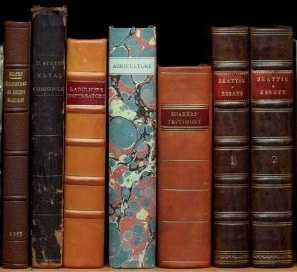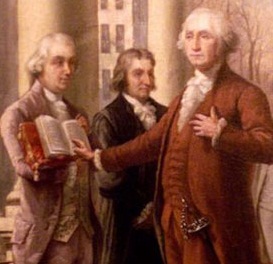On July 3, 1776, John Adams wrote to his wife, “The second day of July, 1776, will be the most memorable epoch in the history of America. I am apt to believe that it will be celebrated by succeeding generations as the great anniversary festival… It ought to be solemnized with pomp and parade, with shows, games, sports, guns, bells, bonfires, and illuminations, from one end of this continent to the other.”
Adams was nearly correct in his prediction. Americans have indeed memorialized the Declaration of Independence as he envisioned; however, the celebrations have been on July 4th—the date written on the Declaration of Independence—instead of July 2nd, the date the Second Continental Congress adopted the resolution of independence. Today, as we celebrate the birthday of George Washington, let us salute the Founding Fathers not only for creating a great nation, but also for being the country’s first book collectors.
George Washington
Although George Washington was considered “too illiterate, unlearned, unread for his station and reputation” by John Adams and Thomas Jefferson, he cared greatly for books and created an impressive collection of his own. An inventory of his library in 1764 listed just three hundred titles, yet Washington worked diligently for the rest his life to increase its holdings. Accounts vary, but most agree that at its peak, Washington’s book collection contained around nine hundred volumes.
The contents of Washington’s library counter claims that he was uneducated. He owned books in several languages including Latin, French, and Dutch. His library boasted a host of different subjects including agriculture, philosophy, politics, history, and literature. The majority of these books were on military and political matters, ranging from works of Plato to those of contemporary political philosophers like Thomas Paine.
After Washington’s death, the Library of Congress acquired a portion of his library. The Boston Athanaeum purchased other volumes. Half of his books were sold at auction, however, and are now the property of individual collectors and private institutions.
Today, the Fred W. Smith National Library for the Study of George Washington—a 45,000 square-foot facility erected between 2010 and 2013 thanks to generous donations—houses Washington's books and manuscripts as well as important, early colonial titles.
Thomas Jefferson
Over the course of his lifetime, Thomas Jefferson collected nearly ten thousand books. He first began collecting as a young man, amassing books on topics ranging from history and law to travel and religion. Jefferson stored these volumes in his family’s home, Shadwell. When Shadwell burned down in 1770, Jefferson supposedly mourned his books most of all.
 Undeterred, he compiled a second library even more extensive than the first. His house, Monticello, included both a book room and a book room annex to store his collection, although books could be found throughout the house. When the British army burned the Congressional Library during the War of 1812, Jefferson offered his book collection as a replacement. Congress purchased these books, numbering 6,487 volumes, for $23,950. The sale was controversial, however, as Jefferson’s books covered a broad number of subjects, more than some members of Congress deemed necessary. Jefferson responded, “There is in fact no subject to which a member of Congress may not have occasion to refer.” With the acquisition of Jefferson’s books, Congress doubled the size of its original library.
Undeterred, he compiled a second library even more extensive than the first. His house, Monticello, included both a book room and a book room annex to store his collection, although books could be found throughout the house. When the British army burned the Congressional Library during the War of 1812, Jefferson offered his book collection as a replacement. Congress purchased these books, numbering 6,487 volumes, for $23,950. The sale was controversial, however, as Jefferson’s books covered a broad number of subjects, more than some members of Congress deemed necessary. Jefferson responded, “There is in fact no subject to which a member of Congress may not have occasion to refer.” With the acquisition of Jefferson’s books, Congress doubled the size of its original library.
After selling his books, Jefferson began collecting again. At the time of his death in 1826, his “Retirement Library” contained 940 items. A second library, stored in his retreat home, Poplar Forest, held another thousand volumes. Although it was customary at the time to organize books alphabetically, Jefferson preferred to arrange his by subject. Sadly, after his death Jefferson’s books were sold at auction to pay his outstanding debts.
Benjamin Franklin
Benjamin Franklin famously founded the Library Company of Philadelphia in 1731, the country’s first lending library and the predecessor of public libraries. Franklin’s personal library was a marvel in its own right, however. In 1787, a visitor to his library described it as “the largest, and by far the best, private library in America.” Details about his library are few; however, in a letter to his sister, Franklin described his library as a room sixteen feet wide by thirty feet with four windows and lined with books to the ceiling.
It is estimated that Franklin’s book collection contained some 4,000 volumes, but his grandson sold it off shortly after Franklin’s death and the books were dispersed at auction. Some were purchased by Thomas Jefferson and thus passed on to the Library of Congress when Jefferson sold his library in 1815. In the 1950s, a researcher discovered many lost volumes from Franklin’s library by decoding the shelving system Franklin wrote in his books and searching through thousands of books from the period. His findings are described in The Library of Benjamin Franklin.
John Adams
 Unlike many of the Founding Fathers, John Adams came from humble beginnings. Although not poor, his family had few luxuries. They did own books but only essential texts and certainly not a library. Adams was an unenthusiastic reader as a child and it was not until he began his studies at Harvard that Adams discovered a love of books. As a law student, he began collecting books in earnest, writing, “I am mostly intent at present, upon collecting a Library, and I find, that a great deal of Thought, and Care, as well as Money, are necessary to assemble an ample and well chosen Assortment of Books.”
Unlike many of the Founding Fathers, John Adams came from humble beginnings. Although not poor, his family had few luxuries. They did own books but only essential texts and certainly not a library. Adams was an unenthusiastic reader as a child and it was not until he began his studies at Harvard that Adams discovered a love of books. As a law student, he began collecting books in earnest, writing, “I am mostly intent at present, upon collecting a Library, and I find, that a great deal of Thought, and Care, as well as Money, are necessary to assemble an ample and well chosen Assortment of Books.”
By the end of his life, Adams’ hard work had paid off. He had collected nearly three thousand texts on subjects ranging from classics and science to agriculture and linguistics. His library has great historic significance today, as it is one of the only early American book collections to remain intact. It is also notable for Adams’ extensive marginalia. Adams left thousands of annotations in the margins of his books, ranging from doodles to criticism. The Boston Library acquired the Adams library in 1894 where it remains today in the Rare Books and Manuscripts Department.











